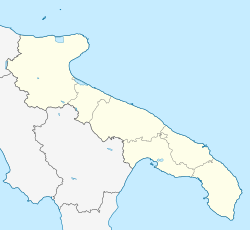
The province of Foggia is a province in the Apulia region of Italy.

Djelfa is the capital city of Djelfa Province, Algeria and the site of ancient city and former bishopric Fallaba, which remains a Latin catholic titular see.

Baza is a town in the province of Granada in Andalusia, twice a former Catholic bishopric and now a Latin Catholic titular see as Basti.

Gargano is a historical and geographical sub-region in the province of Foggia, Apulia, southeast Italy, consisting of a wide isolated mountain massif made of highland and several peaks and forming the backbone of the Gargano Promontory projecting into the Adriatic Sea, the "spur" on the Italian "boot".

Berja is a municipality, former bishopric and Latin titular see in Almería province, in the autonomous community of Andalusia, southern Spain.

Aguilar, or in full Aguilar de la Frontera, is a municipality and town in the province of Córdoba, Andalusia, southern Spain, near the small river Cabra, 50 kilometres (31 mi) from the provincial capital, Córdoba, on the Córdoba-Málaga railway. As Ancient Ipagro, it also was an Ancient/medieval bishopric and remains a Latin Catholic titular see.

Mentana is a town and comune, former bishopric and present Latin Catholic titular see in the Metropolitan City of Rome, Lazio, central Italy. It is located 29 kilometres (18 mi) north-east of Rome and has a population of about 23,000.

Mattinata is a seaside resort town and comune (municipality) in the province of Foggia, Apulia, southern Italy.

San Nicandro Garganico known until 1999 as Sannicandro Garganico) is a small city and comune in the province of Foggia in the Apulia region of southeast Italy.
San Paolo di Civitate is a town and comune in the province of Foggia in the Apulia region of south-east Italy. San Paolo di Civitate was historically an Arbëreshë settlement; the inhabitants, however, no longer use the Albanian language.

Torremaggiore is a town, comune (municipality) and former seat of a bishopric, in the province of Foggia in the Apulia, region of southeast Italy.

Serracapriola is an Italian town of 4.039 inhabitants, located in the province of Foggia, Apulia. It is part of the Gargano National Park, and it is placed at the border between Apulia and Molise, on a hill 270 meters tall.

Vieste is a town, comune and former Catholic bishopric in the province of Foggia, in the Apulia region of southeast Italy. A marine resort in Gargano, Vieste has received Blue Flags for the purity of its waters from the Foundation for Environmental Education. The area covered by the comune is included in the Gargano National Park.

Colletorto is a comune (municipality) of approximately 1,786 inhabitants in the province of Campobasso, in the Italian region of Molise, located about 45 kilometres (28 mi) from the capital of the region Campobasso and 40 kilometres (25 mi) from Termoli (CB), sea town with port, railway and highway A14.

Ottana is a comune (municipality), former bishopric and Latin titular see in the Province of Nuoro in the Italian region Sardinia, located about 110 kilometres (68 mi) north of Cagliari and about 25 kilometres (16 mi) southwest of Nuoro.

Villafranca Montes de Oca is a municipality, former medieval bishopric and present Latin titular see located in the province of Burgos, Castile and León, northern Spain. According to the 2005 census (INE), the municipality has a population of 164 inhabitants.

Policastro Bussentino is an Italian town and hamlet (frazione) of the municipality of Santa Marina in the province of Salerno, Campania region. It is a former bishopric, now titular see, and has a population of 1,625.

Tinja or Tindja (تينجة) is a town and commune (municipality) in the Bizerte Governorate, in northern Tunisia, on the shores of Lake Ichkeul. Its name derives from that of the ancient Roman era city of Thimida, a former bishopric which remains a Latin Catholic titular see.
Civitella d'Arna is a frazione of the comune (municipality) of Perugia in central Italy, and the Ancient city and former bishopric Arna, which remains a Latin Catholic titular see.
The Diocese of Lesina was a Roman Catholic diocese located in the town of Lesina on the northern side of Monte Gargano in the province of Foggia, in the Apulia region of southeast Italy. Erected in the 13th century, it was suppressed in 1567 to the Diocese of Larino. It was restored as a titular see in 1968.





















